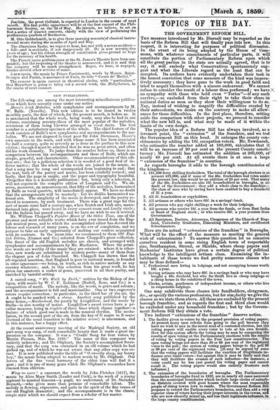NEW PUBLICATIONS.
The following are among the most interesting miscellaneous publica- tions which have recently come under our notice.
Moore's Irish Melodies, with symphonies and accompaniments by M. W. Balfe. (Novelle). This new edition is to be issued in twelve monthly parts, the first of which, for the present month, is before us. It is announced that the whole work, being ready, may also be had in one volume, containing seventy-three of the most popular of the melodies, seventeen of them being likewise arranged as vocal duets. The first number is a satisfactory specimen of the whole. The chief feature of the work consists of Balfe's new symphonies and accompaniments to the me- lodies. We are not disposed to treat poor Sir John Stevenson, Moore's own associate in the work, and with whose name it has been associated for half a century, quite so severely as is done in the preface to this new edition ; though it must be admitted that he was no great artist, and often did his work clumsily. To judge from the number before us, there is no -comparison between his accompaniments and those of Balfe, which are simple, graceful, and characteristic. Other recommendations of this edi- tion are ; that by a judicious selection it is weeded of a good deal of in- ferior matter; that the whole of the words are joined to the music, so that a song may be sung and accompanied from beginning to end ; that the text, both of the poetry and music, has been carefully revised ; and lastly, that the page is ample, and the paper and typography beautiful. Altogether this is a desirable publication ; but, being only a selection, it will not supeisede the complete edition of Longman and Co. We ob- serve, moreover, an announcement, that fifty of the melodies, harmonized by Balfe as vocal quartets, will immediately appear. We have no doubt that the arrangements will be masterly : but we dislike harmonized na- tional airs. The simplicity of the music is destroyed, and the poetry re- duced to nonsense, by such treatment. There was a great rage for this sort of music some half a century ago, when Scotch and Irish airs, manu- factured into glees, were heard in every concert-room and family circle ; but the fashion has passed away, and we have no wish to see it revived.
Mr. William Chappell's Popular Music of the Olden Time, one of the greatest and most valuable works which have ever issued from the Eng- lish musical press, and to which the accomplished editor has devoted the labour and research of many years, is on the eve of completion, and we purpose to take an early opportunity of making our readers acquainted with its contents. In the mean time we recommend to them Old Eng lish _Ditties, (Cramer and Co.) selected from Chappell's great collection. The finest of the old English melodies are chosen, and arranged with symphonies and accompaniments by Mr. Macfarren. Where the primi- tive words are worthy of the music they are retained : where it is other- wise, new words are substituted by modern poets—many of them from the elegant pen of John Oxenford. Mr. Chappell has shown that the oft-repeated assertion, that England is poor in national music, is founded in utter ignorance—we being, in truth, as rich in native melody as any country whatever; and, in this selection from his great work, he has given our amateurs a casket of gems, preserved in all their purity, and enriched by tasteful setting.
A sacred song, " We Walk by Faith," written by the Bishop of An- tigua, with music by W. C. F. Robinson (Bilden, Rose, and Co.) is a composition of merit. The melody, like the words, is grave and solemn ; and the accompaniment is full and musicianlike. One or two engraver's errors require correction : in particular, in the third bar of the air, the A ought to be marked with a sharp. Another song published by the same house,—Maidenhood, the poetry by Longfellow, and the music by Stella—is also worthy of notice. Longfellow's sweet verses have a pe- culiar measure, being in triplets of three lines which rhyme together—a feature of which good use is made in the musical rhythm. The modu- lation, in the second part of the air, from the key of G major to E major (instead of the usual transition to the relative minor) is uncommon, and in this instance, has a happy effect.
At the recent anniversary meeting of the Madrigal Society, an old part-song was sung, of such remarkable beauty that it made a great im- pression on the company. It was a "Cradle Song for four voices, by Martin Pierson, Mus. Bac. 1620." The name of this composer was entirely unknown ; and Mr. Oliphant, the Society's accomplished Secre-
, said that the song was contained in an old volume which he had picked upt and of which he was not aware that any other copy was ex- tant. It is now published under the title of " 0 sweetly sleep, my bonny boy," the music being adapted to modern words by Mr. Oliphant. Our lovers of the fine vocal harmony of the olden time will find it a gem ; and it is one of many gems which Mr. Oliphant's researches have rescued from oblivion.
Weep no more ! a canzonet, the words by John Fletcher (1617), the music by Alice Mary Smith (Leader and Cock), is the work of a young aspirant to musical honours—a pupil, we understand, of Dr. Sterndale Bennett,--who gives more than promise of remarkable talent. The melody is flowing, expressive, and quite in the spirit of the fine verses of our old English dramatist ; and the accompaniment is in the chaste, simple style which we should expect from a scholar of her master.


























 Previous page
Previous page